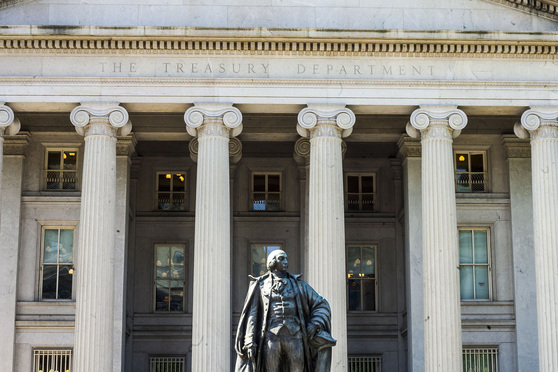
Outside of occasions when the U.S. Treasury Department is running down its cash pile while awaiting congressional action to raise the debt limit, bond market participants don’t typically pay much attention to the department’s payments-processing division. That may be about to change in light of efforts by the government efficiency initiative being run by billionaire Elon Musk.
Musk said in social media posts over the weekend that his “DOGE team” of enforcers is shutting down some payments, claiming that “corruption and waste is being rooted out in real time.”
Recommended For You
If the Musk team veered into legally legitimate transfers, that could spark debate over whether the federal government is following through on its obligations. Former Treasury Secretary Janet Yellen said repeatedly—during debt-limit standoffs—that even prioritizing some payments ahead of others amounted to “default by another name.” Trump’s first Treasury chief, Steven Mnuchin, said in 2017 that “the government should honor all of its obligations.”
The newly installed Treasury chief, Scott Bessent, hasn’t publicly commented on Musk’s claims, and the Treasury Department didn’t respond to a request for comment. Asked about the potential credit-quality implications of any move by DOGE to halt payments through Treasury’s systems, Moody’s Investors Service declined to comment. S&P Global Ratings and Fitch Ratings didn’t immediately respond to a request for comment.
“It’s a really complex situation,” said John Fagan, who ran Treasury’s markets-monitoring group from 2014 to 2018 and is now a principal at Markets Policy Partners. “What it means legally and administratively depends a lot on how it’s done and what is done to whom.”
In a post Monday, Musk said, “The only way to stop fraud and waste of taxpayer money is to follow the payment flows and pause suspicious transactions for review.” The Treasury already has a Do-Not-Pay system in place designed to prevent such payments. In October, the department announced that its fraud-detection services had prevented and recovered over $4 billion in the 2024 fiscal year.
Treasury officials have long maintained that the department’s role is to serve as the federal government’s checkbook—and that the decision about whether to approve or deny payment belongs to individual agencies based on funds appropriated by Congress.
Trump on Monday underscored that “Elon can’t do and won’t do anything without our approval,” speaking to reporters in the Oval Office. Yesterday, Trump said, “He’s a big cost-cutter. Sometimes we won’t agree with it and we’ll not go where he wants to go, but I think he’s doing a great job. He’s a smart guy, very smart, and he’s very much into cutting the budget of our federal government.”
Amid the efforts by Musk’s group to access Treasury’s payment system, the department’s most senior career official, who oversaw that part of Treasury, departed last week. David Lebryk, the Treasury’s fiscal assistant secretary for more than a decade, had served as acting Treasury secretary before Bessent took the helm last week.
“The government makes a jillion payments a year. Some of those payments being held up or having delayed government payments isn’t necessarily a default,” said Fagan, the former Treasury official. “What is the legal or otherwise administrative basis for nonpayment? How is the nonpayment communicated? It all starts getting into the weeds very quickly.”
————————————————————
© 2025 ALM Global, LLC, All Rights Reserved. Request academic re-use from www.copyright.com. All other uses, submit a request to [email protected]. For more information visit Asset & Logo Licensing.




